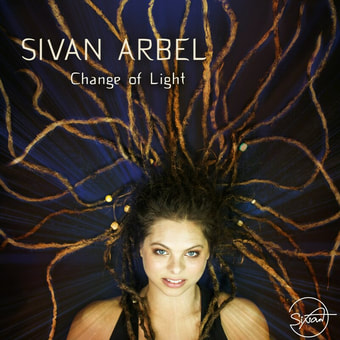
Sivan has continued to perform and compose and evolve and it has all been tracked with great attention through Facebook and YouTube. What she revealed along the way was like the aromas coming from your grandmother’s kitchen. The release of her latest album is like finally sitting down at the dinner table.
On Change of Light, Sivan has composed six of the seven tracks, with the sole exception of Water Song, the fourth track, which is an Israeli folk song. And, once again, she has also gathered to herself that splendid array of artists to support her vision and her compositions. It is almost the same line-up as that on Broken Lines and I couldn’t be happier. Shai Portugaly is on piano, Pera Krstajic (the only newcomer) is on bass and Yogev Gabay is on drums forming the core trio. Joining them are Ron Warburg (trumpet), Jack Sheehan (alto saxophone), and Ori Jacobson (tenor saxophone). They, too, have improved on what I thought could not be improved.
Change is the opening track and, as much as I loved the opening of Broken Lines, she has truly leapt forward. Cymbal washes and sweet piano open the album. Gabay and Jacabson have a fantastic row together. The rhythm section, the horns, everybody shines on. And those exquisite vocals… Sivan makes these unexpected shifts that take your breath away.
Homesick is a beautiful lamentation that is underscored with Portugaly’s sweet touch on the piano and a melodic play between the horns. It climbs and soars while Krstajic’s bass and Gabay’s drums anchor it all. Even as early as the end of this, the second track, it has become clear that Sivan’s composing is rich and full of texture and lush colors. And these musicians know exactly how to treat it. Krstajic’s bass work nearly the close is especially interesting and then the whole band joins him to carry it before Sivan and Warburg’s trumpet close it out. Beautiful.
Then the horns pick up the intro to Solitude in one of the coolest transitions you’d ever want to hear. The melody does not follow the line you would expect as the horns and Sivan run now together-now apart. The vocal control Sivan shows is stunning.
As mentioned, Water Song is an Israeli folk song and it is beautiful. An inherent sadness opens the song before surrendering to a determined optimism. The bass and drums create a thunder that heralds the onset of rain. The Portugaly taps at the end keys as Warburg creates a sheet of lightning effect with the horn. This is a Jazz tone poem. Cascades and torrents of sound rush over you and the effect is wondrous.
One of the sweetest moments on the album is He Sees Her. But it is not the syrupy sweet stuff that is truly beneath Sivan Arbel. It is captivating—even rapturous—in its staggering, overwhelming emotion. Cacophony is supplanted by a skyward ascent. Fascinating.
Omri is a cool, andante, languid glide. The trumpet is deliberately throaty and raw while the piano holds the structure around Sivan’s plaintive vocals. At 8:12, it is the longest piece on the album and you love every minute of it. Omri just may be the quintessential Jazz vocal expression for the 21st Century.
The album closes with Not Over Yet which is a tease, if ever there was one. Portugaly and Gabay have some cool duet time and then Krstajic’s bass joins for an excellent trio excursion. The horns jump aboard and everyone carries it together to the abrupt but satisfying end.
This is vocal Jazz the way I like. It is full of unexpected turns and twists and follows rivulets to wondrous places. It intrigues your head and touches your heart.
~Travis Rogers, Jr. is The Jazz Owl
 RSS Feed
RSS Feed
